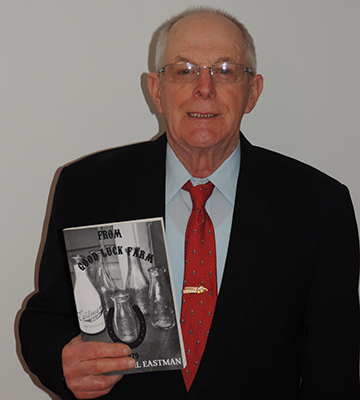By Michael L. Yeoman

(Durhamville, NY – July 8, 2015) For Russ Eastman of Durhamville telling a story has never been struggle. If you have the opportunity meet him you would be quickly immersed in the stories of his life.
“Friends and family often told me that I should write a book,” Eastman said. And so, this near-octogenarian initially set out to tell the story about his childhood in his first published book – From Good Luck Farm.
The newly penned author has book signing events scheduled on Wednesday July 15 at 7 p.m at the Oneida Public Library and July 18 from 10 a.m. to 3 p.m. at the Beeches in Rome.
“I started on a typewriter and went through a lot of Whit Out,” Eastman said. He recalls hearing his wife, Peg wondering in bewilderment as to just how long it was going to take to write this book as sentences turn into paragraphs, paragraphs turned into pages and the pages were penned into the final written manuscript.
From Good Luck Farm takes the reader through the lives of one of the earliest families in the United States, “The Eastmans.” According to Eastman, Roger Eastman, was the first family member to brave the winds and waves as he arrived in the United States on the ship Confidence in April of 1638.
Most of the book, however, is centered around what it was like to grow up on Good Luck Farm in the early 20th Century – a time when the technologies of today could not even be imagined.
Eastman said that Good Luck Farm was given to Howard Socrates Eastman and his bride Flora Belle Camp Eastman as a wedding gift in 1877. It was on this farm that the family raised 12 children. The honor roll of Eastman’s forefathers is well detailed throughout the book. He reports the many accomplishments of family members including Lester Eastman who with his associate and developed the first micro-chip, which later became the essential element of the microwave oven.
“Growing up on a dairy farm in Upstate New York in the first half of the 20th Century was not easy,” Eastman said. It was not until 1941 that milk pasteurization became the norm in milk production. According to Eastman, this required the need to keep the milk chilled so an ice house was erected that stored the ice harvested in the winter specifically for this purpose. Much of the milk was then transported by railroad to customers in New York City.
Eastman told the story of his father purchasing a silo from another farmer in the village. Ingenuity set in as his father rigged up wheels on both ends of the silo, and with a four-horse hitch proceeded to transport this structure right down the village streets of Waterville.
“I recently had a conversation with a young man in Oneida who read the book and was surprised to find out just what farm life was like in the early 20th century,” he said.
Sharing his personal stories of siblings and other relatives, Eastman is able to connect with the reader – not only on a historic level, but an intimate, personal level as well. The reader will feel a part of the Eastman family as the author keeps them engaged with this historic family.
Eastman shares his roots with George Eastman – founder of Eastman Kodak and in this book and details some little know facts about this prominent inventor and business man.
From Good Luck farms is available for sale on Amazon and Barnes and Noble and locally at Nothing Fancy, Corner Diner II, Sweet Temptations, Choo Choo Charlies, Oneida Commons, and Early’s Country Farm Store.
“More merchants are being added daily,” Eastman said. He is already on his second printing.
Eastman is not finished yet. The former canning factory worker, farmer, tree surgeon, lineman, antique car restorer, stained glass artisan, teacher, toy maker and carpenter has many more stories to tell.
Eastman already had a notebook full of ideas for his next book, which will detail his life from age 22 through retirement.

